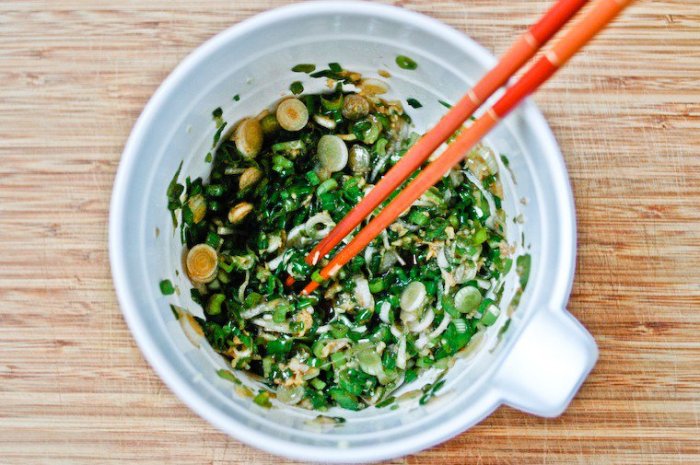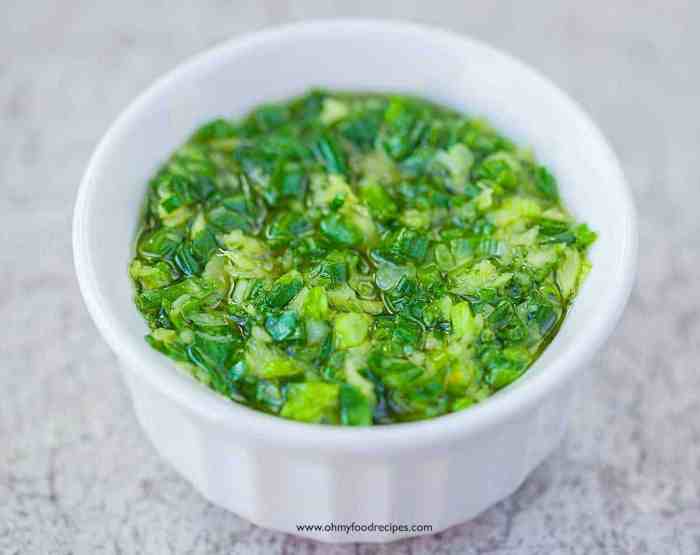Scallion Sauce: A Culinary Exploration

Source: cnz.to
A simple yet flavorful scallion sauce recipe relies on the perfect balance of fresh scallions, soy sauce, and a touch of sesame oil. This complements many dishes, and it’s just one example of the vast world of sauces you can explore when preparing stir-fries; for more inspiration, check out this helpful guide on sauces for stir-fry recipes.
Ultimately, the best scallion sauce is the one that best enhances your chosen stir-fry ingredients.
Scallion sauce, a deceptively simple condiment, holds a prominent place in various Asian cuisines. Its origins are somewhat obscure, likely evolving independently across different cultures, but its widespread use speaks to its enduring appeal. This versatile sauce adds a vibrant pop of flavor and a fresh, herbaceous note to a wide array of dishes, from noodles and dumplings to meats and vegetables.
A good scallion sauce boasts a balance of savory, slightly sweet, and pungent notes, with a refreshing texture that complements the other flavors in a dish.
Essential Ingredients and Variations
The foundation of scallion sauce rests on a few key ingredients: finely chopped scallions, oil (sesame oil is traditional but others work well), soy sauce, and often a touch of sugar or rice vinegar for balance. Variations arise primarily from the choice of oil and the addition of other aromatics.
Here are three variations, each highlighting the distinct character of a different oil:
- Classic Sesame Oil Scallion Sauce: This version utilizes toasted sesame oil for its nutty aroma and rich flavor, creating a classic profile. The deep, toasted notes of sesame oil beautifully complement the fresh scallions.
- Peanut Oil Scallion Sauce: Substituting peanut oil introduces a subtle earthiness and a slightly creamy texture. This variation pairs exceptionally well with dishes featuring peanut flavors or those seeking a richer, more substantial sauce.
- Vegetable Oil Scallion Sauce: Using a neutral-flavored vegetable oil allows the bright flavor of the scallions to take center stage. This is a good option for those who prefer a cleaner, less assertive flavor profile.
The type of scallion also impacts the final product. Spring onions, with their milder flavor and softer texture, produce a gentler sauce. Green onions, with their more pungent bite, yield a bolder, more assertive flavor.
| Ingredient | Sesame Oil Version (per 100g) | Peanut Oil Version (per 100g) | Vegetable Oil Version (per 100g) |
|---|---|---|---|
| Calories | Approx. 250 | Approx. 280 | Approx. 200 |
| Fat (g) | Approx. 25 | Approx. 30 | Approx. 20 |
| Sodium (mg) | Approx. 500 | Approx. 450 | Approx. 400 |
| Carbohydrates (g) | Approx. 5 | Approx. 4 | Approx. 6 |
Note: Nutritional information is approximate and can vary based on specific ingredients and brands used.
Classic Scallion Sauce Recipe
This recipe guides you through creating a versatile classic scallion sauce.
- Prepare the Scallions: Finely chop about 1 cup of scallions. The finely chopped scallions should resemble a bright green snowdrift before mixing. Aim for a consistent chop to ensure even distribution of flavor and texture.
- Combine Ingredients: In a small bowl, whisk together ¼ cup toasted sesame oil, 2 tablespoons soy sauce, 1 tablespoon rice vinegar, and 1 teaspoon sugar. The mixture should be well-combined and slightly glossy.
- Incorporate Scallions: Gently fold in the chopped scallions. Avoid overmixing, as this can bruise the scallions and release excess moisture, resulting in a watery sauce.
- Adjust Consistency: For a thicker sauce, let the mixture sit for at least 15 minutes to allow the scallions to release some moisture and the flavors to meld. For a thinner sauce, add a teaspoon or two of water at a time until desired consistency is reached.
- Taste and Adjust: Taste the sauce and adjust seasonings as needed. You might want to add more soy sauce for saltiness, sugar for sweetness, or rice vinegar for acidity.
Storage and Shelf Life

Source: ohmyfoodrecipes.com
Proper storage is crucial for maintaining the freshness and quality of your homemade scallion sauce.
Store the sauce in an airtight container in the refrigerator. Under optimal conditions, homemade scallion sauce will typically last for 5-7 days. Freezing is also an option, extending the shelf life to several months. However, freezing may slightly alter the texture.
Signs of spoilage include a sour or off-putting odor, mold growth, or a significant change in color or texture. Discard any sauce showing these signs.
Culinary Applications
Scallion sauce’s versatility extends across numerous dishes and culinary traditions.
- Dipping Sauce: Perfect for dumplings, spring rolls, potstickers, and steamed buns.
- Marinade: Adds a vibrant flavor to meats, poultry, and tofu before grilling, stir-frying, or baking.
- Condiment: Elevates noodle dishes, rice bowls, and congee.
In Chinese cuisine, it’s a staple; in Japanese, it might be a component of a larger sauce; Korean cuisine might incorporate it into a bibimbap or other dishes. Its adaptability is remarkable.
- Creative Uses: Try it as a topping for roasted vegetables, a drizzle over grilled fish, or as a component in a flavorful vinaigrette.
Troubleshooting Common Issues
While making scallion sauce is relatively straightforward, some common problems can arise.
- Bitter Taste: This might be due to using overly mature scallions or over-mixing the sauce, releasing bitter compounds. Using younger, fresher scallions and gentle handling can prevent this.
- Watery Consistency: Overly vigorous chopping, using too much water for thinning, or not allowing enough time for the scallions to release moisture can lead to a watery sauce. Using a sharp knife for a fine chop, careful addition of water, and allowing time for the sauce to sit are key solutions.
Preventing mistakes involves using fresh, high-quality ingredients, following the recipe closely, and paying attention to the texture and flavor as you go.
FAQ Explained: Scallion Sauce Recipe
Can I use frozen scallions?
Yes, but thaw them completely and pat them dry before using to avoid a watery sauce.
How long does scallion sauce last in the freezer?
Properly stored in an airtight container, scallion sauce can last for up to 3 months in the freezer.
What if my scallion sauce is too thick/thin?
Add a bit of water or oil to thin it, or simmer gently to thicken it.
Can I make a large batch and store it?
Absolutely! Making a larger batch is efficient. Ensure proper storage for optimal freshness.
